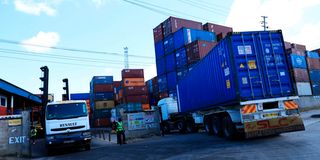Prime
Mandatory cargo tagging to stay, South Sudan maintains

Cargo trucks enter a container depot within the Portrietz area in Mombasa in this photo taken on 26 September 2022.
What you need to know:
- Now Juba has directed East African countries to comply with the directive with immediate effect.
- Juba argues the seals help to track how cargo is moved as they give the authorities quick and clear details about what the cargo is, how much it is worth and its destination
South Sudan maintains that all cargo imported or exported from the country must have special seals it will provide despite a legal challenge mounted by traders who oppose the move.
The new directive came five months after Kenyan clearing and forwarding agents moved to court to compel South Sudan authorities to suspend the introduction of a second cargo tracking seal.
Now Juba has directed East African countries to comply with the directive with immediate effect.
In a notice issued on August 13, South Sudan Revenue Authority (SSRA) Commissioner for Corporate Services
Dr Daniel Kon Ater informed stakeholders in Uganda, Kenya and Tanzania to tag goods destined to their country, alongside the requisite with Electronic Cargo Tracking Note (ECTN).
Dr Ater said that all taxpayers, clearing and forwarding agents and transporters, including non-governmental organisations involved in moving cargo destined to and from that country should attach South Sudan’s regionally recognised electronic cargo tracking seal.
“We are asking all involved in cargo handling for both dry and wet ports transit cargo destined to and from South Sudan to comply; failure to do so will result in a fine at the border entry points by the SSR division office,” said Dr Ater.
Sparked protests
In March this year, the SSRA introduced its tags on top of those offered by the Regional Electronic Cargo Tracking (RECT) at $350 per consignment. This sparked protests among stakeholders, and clearing and forwarding agents in Kenya moved to court.
However, the High Court sitting in Mombasa declined to stop the authority from implementing the order.
This week, Kenya International Freight and Warehouse Association (Kifwa) chairman Roy Mwanthi said: “We negotiated for collection of the funds at Nimule, instead of Mombasa. It was a relief to clearing and forwarding agents.”
Juba argues the seals help to track how cargo is moved as they give the authorities quick and clear details about what the cargo is, how much it is worth and its destination, hence it helps in stopping illegal activities like fraud, under-reporting the value of goods and smuggling.
Kenyan clearing and forwarding agents had blamed the introduction of the ECTN for delayed cargo clearance. They were often required to pay ECTN fees alongside clearance charges. They also protested the payment of $350 to a private firm appointed by SSRA for security seals.
In March, the South Sudan Government said the more than 1.5 million metric tonnes of cargo passing through the Port of Mombasa to South Sudan will have to be tagged before leaving the country as the country installed measures to control illegal, undeclared entry of goods into the country.
South Sudan Minister of Finance and Planning Dr Bak Barnaba Chol said the government had appointed INVESCO Uganda Limited as the legally contracted agency under supervision by the SSRA to operationalise ECTN.
The minister said ECTN is to be implemented by the SSR and will be mandatory for all goods destined to South Sudan and all goods leaving the country with immediate effect.
“The sole purpose of the ECTN is to help the government of South Sudan to maximise its revenue collection by remedying the challenges of underestimation, undervaluation, diversion of cargo and round-tripping,” said Dr Chol.





